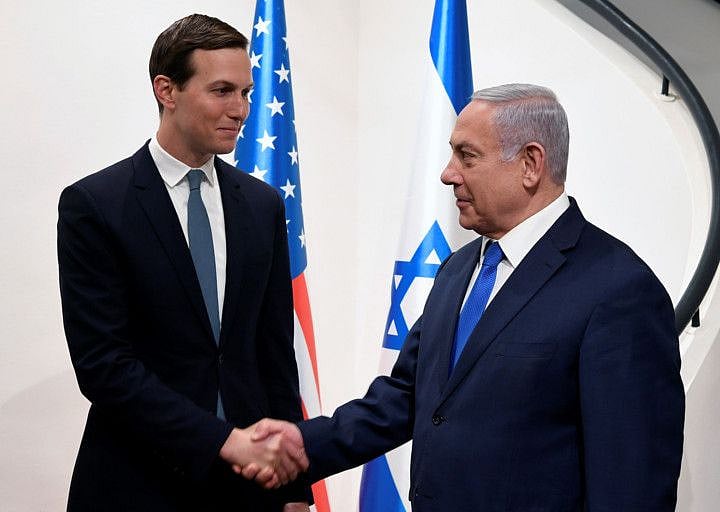Mideast plan likely to be delayed as Israel plans new polls
Plan could end up becoming a vehicle to resurrect Netanyahu’s political fortunes

Also In This Package
Washington: President Donald Trump plans to throw his full weight behind Benjamin Netanyahu’s campaign to save his job as prime minister of Israel.
But to do that, analysts and former diplomats said, the president will have to sacrifice any last hopes of proposing a peace plan that is acceptable to both Israelis and Palestinians.
Trump’s son-in-law and senior adviser, Jared Kushner, met Netanyahu in Occupied Jerusalem to discuss the status of the plan Thursday, hours after the prime minister failed to form a governing coalition.
Kushner emerged with a longer timetable and a narrower diplomatic mission, these people said.
Rather than make concessions to the Palestinians, Kushner will be under pressure to tilt the plan ever further in Israel’s favour.
Far from being a bold effort to break decades of enmity between the two sides, it could end up becoming a vehicle to resurrect Netanyahu’s political fortunes and to protect Trump’s.
The plan, which Kushner has drafted under a veil of secrecy for more than two years, was already looking like a doomed effort.
Though its details remain unknown, Kushner has suggested it will not call for the creation of a Palestinian state, jettisoning decades of US policy toward the conflict.
The Palestinians have vowed to reject it out of hand, branding it a blueprint for Israeli domination.
Certainly, a wounded Netanyahu lost no time in exploiting his friendship with Trump.
He brandished a copy of a map of Israel that Trump had signed and sent to him with Kushner.
In the margins, the president had drawn an arrow pointing to the long-disputed Golan Heights, which he had recognised as Israeli territory, and had scrawled “Nice.”
The White House is expected to hold off on the political component of its plan - which deals with thorny issues such as borders, security and the status of Occupied Jerusalem - until after the Israeli elections, set for Sept. 17.
A senior administration official said only that the plan would be presented when the “timing is right.”
Problematic timing
But that timing has grown increasingly problematic.
Any new Israeli coalition probably would not be formed until at least October, which would delay the announcement of a Trump plan until November, uncomfortably close to the first primaries of the 2020 election in the United States.
Trump, eager not to alienate evangelical voters or influential pro-Israel donors like casino magnate Sheldon Adelson, is unlikely to present a plan that would put Israel or Netanyahu in an awkward position.
For both leaders, therefore, the political calculus will argue for a plan that makes as few demands of Israel as possible.
“To get Netanyahu re-elected, Trump is clearly now willing to take instructions from him,” said Martin Indyk, former US ambassador to Israel.
“I believe Netanyahu will return the favour by arguing forcefully to American Jews and evangelical voters that they should vote for Trump because he’s the best friend Israel has ever had.”
Close allies
Trump has already gone further in his support of Netanyahu than any president has for any Israeli leader.
Before recognising Israeli authority over the Occupied Golan Heights, he moved the US Embassy from Tel Aviv to Occupied Jerusalem.
And in a remarkable intrusion into Israeli electoral politics, Trump on Monday tweeted his support of Netanyahu’s efforts to form a coalition.
“Hoping things will work out with Israel’s coalition formation and Bibi and I can continue to make the alliance between America and Israel stronger than ever,” Trump said, using the prime minister’s nickname. “A lot more to do!”
Two days later, the White House announced an unprecedented three-way meeting in Occupied Jerusalem between national security adviser John Bolton and his Israeli and Russian counterparts, Meir Ben-Shabbat and Nikolay Patrushev.
The meeting, to discuss security issues in the Middle East, is a feather in the cap for Netanyahu, underlining his ability to convene the world’s major powers.
Pro-Israel plan
Indyk said a staunchly pro-Israel peace plan - one that snuffed out the goal of a two-state solution, for example - would constitute Trump’s third major gesture to Netanyahu, after the embassy and Golan Heights.
This week, after Netanyahu’s coalition negotiations collapsed, Trump made no effort to disguise his disappointment.
“It looked like a total win for Netanyahu, who’s a great guy,” the president said.
“That is too bad. Because they don’t need this. I mean they’ve got enough turmoil over there. It’s a tough place.”
Kushner’s visit to Occupied Jerusalem coincided with the Israeli Parliament’s vote to dissolve itself and call for new elections - arguably one of the darkest days in Netanyahu’s career.
But rather than wave him off, the prime minister welcomed Kushner, posing for pictures and showing off the letter from Trump.
“What happened in Israel over the last 48 hours gives them a more public rationale for why they’re delaying, so it’s actually good news for them tactically,” said David Makovsky, who negotiated between the Israelis and Palestinians during the Obama administration. “The Israeli election has given them an out.”
The trouble is, the political atmosphere for a peace initiative is not likely to get any less forbidding in the fall. Kushner, who helped manage his father-in-law’s campaign in 2016, will be as aware as anyone of the domestic political cost of a plan that puts pressure on Israel.
“You’ll see the political folks in the administration weighing in on how it affects the election dynamics,” said Ghaith Al Omari, a former Palestinian negotiator who is a senior fellow at the Washington Institute for Near East Policy.
“We’ll get into a totally different set of considerations by November and December.”
Sign up for the Daily Briefing
Get the latest news and updates straight to your inbox
Network Links
GN StoreDownload our app
© Al Nisr Publishing LLC 2026. All rights reserved.